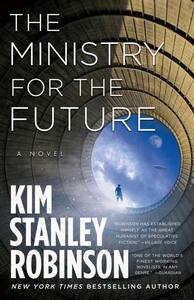Take a photo of a barcode or cover
hopeful
inspiring
reflective
sad
medium-paced
Plot or Character Driven:
Plot
Strong character development:
Yes
Loveable characters:
Yes
Diverse cast of characters:
Yes
Flaws of characters a main focus:
No
Kim Stanley Robinson heeft met dit boek een erg realistische blik op de toekomst geworpen met alle problemen die ons te wachten staan van dien. De manier waarop hij deze uitdagingen benaderd zijn erg mooi en daarnaast geeft hij veel opties en inspiratie voor manieren om onze huidige trendlijn aan te passen. Niet alleen lost hij met dit boek onze problemen op, maar ook geeft hij het verhaal een hoopvolle draai, door het positief te laten eindigen.
Warning: very nerdy. 80% technology of climate mitigation (including finance + politics) only 20% novel. I enjoyed reading it, but it's not for everyone.
I enjoy his writing style, but many will not. Just read the first chapter as a short story.
This was outside of my comfort zone and I didn't realize what kind of story and writing style this author had since this read like a collection of essays on climate change and possible solutions with a vague storyline underneath
A great vision of what might be in store for us in terms of the climate crisis and a plausible account of the wins and losses and how we might just get through it. It demonstrated such a broad spectrum of knowledge and ideas - a real tour de force. I loved especially the idea that we can only be safe when everyone is safe, and covid has demonstrated that perfectly. My only criticism is that a key solution relied on blockchain technology, yet a crypto currency transaction is about 1000 times more energy intensive than a visa transaction, so I wouldn't be promoting that as a way forward.
i fear the le guins and richard powers of the world have warped my sense of good eco-fiction because this felt overhyped to me even though i still really enjoyed. a nice time to flex the PPE muscles. the ending page was pitch perfect:
“That we could become something magnificent, or at least interesting. That we began as we still are now, child geniuses. That there is no other home for us than here. That we will cope no matter how stupid things get. That all couples are odd couples. That the only catastrophe that can't be undone is extinction. That people can take their fate in their hands. That there is no such thing as fate.”
“That we could become something magnificent, or at least interesting. That we began as we still are now, child geniuses. That there is no other home for us than here. That we will cope no matter how stupid things get. That all couples are odd couples. That the only catastrophe that can't be undone is extinction. That people can take their fate in their hands. That there is no such thing as fate.”
“She tried to put that together with the bubbling roar of the crowd, the overlapping music, the lake and the sky; it was too big. She tried to take it in anyway, feeling the world balloon inside her, oceans of clouds in her chest, this town, these people, this friend, the Alps— the future-all too much. She clutched his arm hard. We will keep going, she said to him in her head—to everyone she knew or had ever known, all those people s so tangled inside her, living or dead, we will keep going, she reassured them all, but mostly herself, if she could; we will keep going, we will keep going, because there is no such thing as fate. Because we never really come to the end.”
This is an amazing bit of work. He imagines the future of the fight against climate change in a way that is reminiscent of World War Z. It's told from lots of different standpoints in many corners of the world and combines realistic stories of people on the ground, experiencing the changes, with, in the other hand, policy makers, economists and scientists trying to out together a series of measures that will turn back the tide.
If it has a weakness it's that it's so optimistic. The idea that a few million deaths in india would bring the world (including, let us remember, America and other stubbornly denialist nations) together in harmony, and that none of them would see it as an opportunity to jockey for their own supremacy just seems a bit unlikely. But that's OK, it's a well-told story and, in a way, the realistic story can only be a sort of cautionary tale, whereas this seems to be trying to plot a course through and suggest some policy levers that might be pulled. And I like that.
The characters all have different points of view, and it's probably not a good idea to imagine he agrees with them all. Does he support terrorism? I assume not. Does he support a capitalist program to harness economics or a sort of hippy eco-communism? Don't know, but obviously the characters to have opinions and they re bashing away at the problem from different standpoints, trying to resolve other questions along the way, and bring the planet out at a happier more sustainable equilibrium.
I'm not absolutely sure how many of the technologies he mentions are real. Some obviously are, some not, but where the line is, I'm not sure. I'd quite like to read an explainer on the facts behind the book, actually, that would be good.
Anyway, recommended if you want to read something that has something positive to say and will get you thinking, this is a pretty good option!
If it has a weakness it's that it's so optimistic. The idea that a few million deaths in india would bring the world (including, let us remember, America and other stubbornly denialist nations) together in harmony, and that none of them would see it as an opportunity to jockey for their own supremacy just seems a bit unlikely. But that's OK, it's a well-told story and, in a way, the realistic story can only be a sort of cautionary tale, whereas this seems to be trying to plot a course through and suggest some policy levers that might be pulled. And I like that.
The characters all have different points of view, and it's probably not a good idea to imagine he agrees with them all. Does he support terrorism? I assume not. Does he support a capitalist program to harness economics or a sort of hippy eco-communism? Don't know, but obviously the characters to have opinions and they re bashing away at the problem from different standpoints, trying to resolve other questions along the way, and bring the planet out at a happier more sustainable equilibrium.
I'm not absolutely sure how many of the technologies he mentions are real. Some obviously are, some not, but where the line is, I'm not sure. I'd quite like to read an explainer on the facts behind the book, actually, that would be good.
Anyway, recommended if you want to read something that has something positive to say and will get you thinking, this is a pretty good option!
political imagination is important to deal with the ongoing and upcoming climate apocalypse but KSR situates his imagination in swiss office buildings and monetary policy while there's compelling direct action and "how to blow up a pipeline" tactics going on around them. who are the real agents of change???
DNF at about 60%. Book had lots of interesting ideas and I found myself thinking about it a lot. But reading it was depressing. The format was also tough for me and was feeling like a slog when I wanted to read for pleasure. May come back to it.



